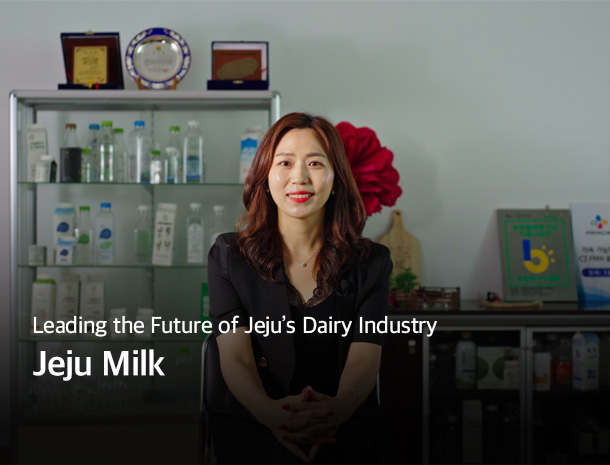Industry Trends
- Home
- Jeju Life
- Industry Trends
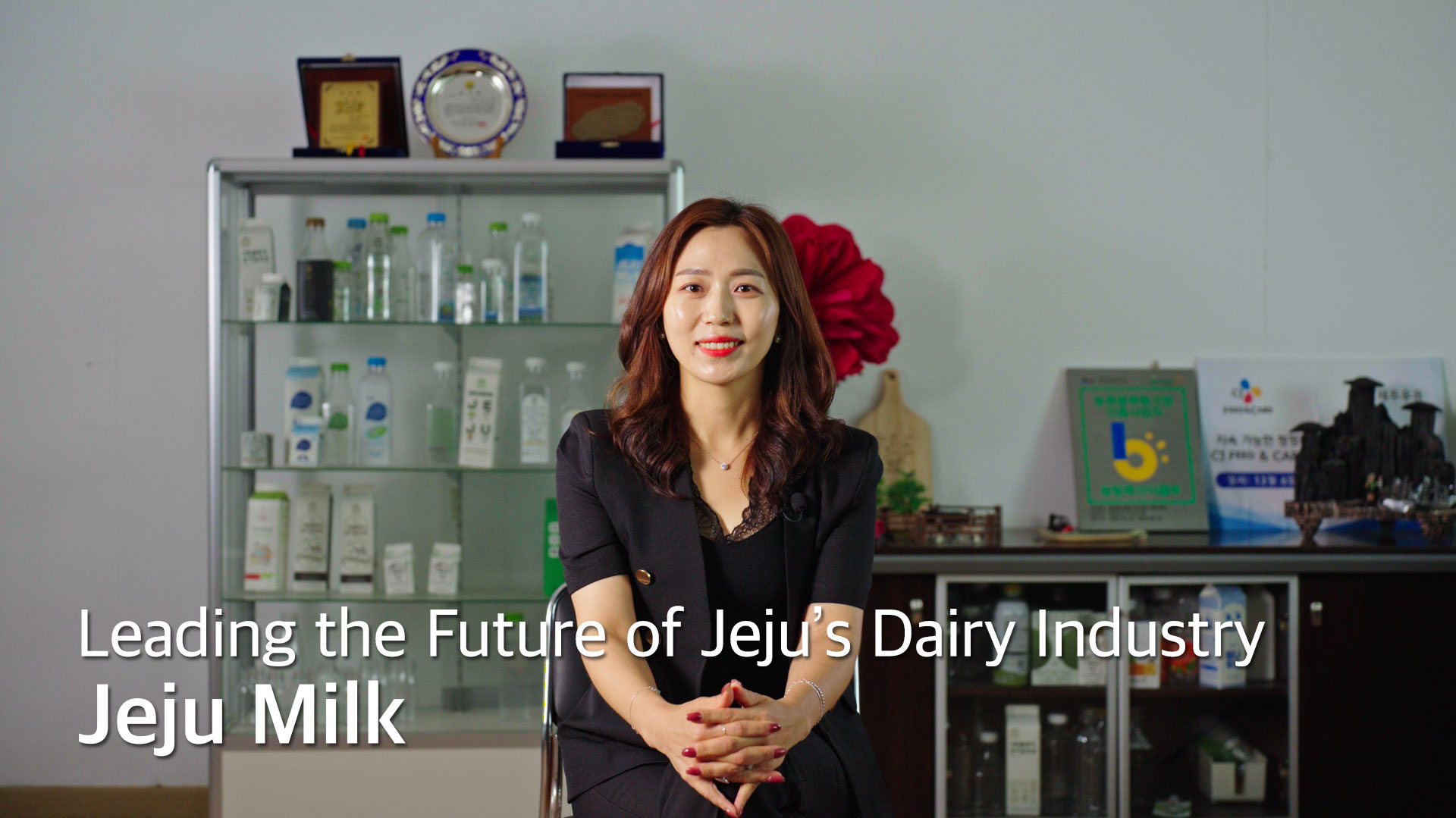
“Jeju Milk is the largest dairy processing company in Jeju, handling an average of 35 tons of raw milk daily. We operate under a unified management system that covers everything from raw milk processing to the manufacturing and sales of finished products. We have earned premium certifications in areas like animal welfare, low methane production, and organic farming. Our cows are raised in Jeju's pristine environment, benefiting from the clean air of Hallasan Mountain and volcanic bedrock water. We’ve also introduced ICT smart farming to build a state-of-the-art farming infrastructure. Moreover, we offer a range of products made from various milk sources, including clean milk, antibiotic-free milk, and Jersey milk. Jeju Milk continuously collaborates with local dairy farmers to create a better future for the dairy industry, rooted in sustainable agriculture that benefits both nature and people.”
Kim Kyung-eun, Executive Director of Jeju Milk
|
Maximizing Efficiency with a Unified Management System, From Raw Milk to Finished Products |
Founded in 1985, Jeju Milk has been a local company dedicated to the development of the regional dairy industry for over 30 years. In 2022, Jeju Milk entered a new phase when it was acquired by the Dain Farm Agricultural Union Cooperative, marking the first time in Korea that a dairy farm had taken over a dairy processing company. After transforming into an agricultural corporation, Jeju Milk began collaborating with local dairy farmers to develop specialty products using milk produced in nature. The company focused on producing high-value raw milk by providing training on eco-friendly agricultural certifications and obtaining HACCP, international organic livestock, and antibiotic-free livestock certifications. It also introduced Jersey cows to its operations. Following this, Jeju Milk has pursued ICT smart farming, enhancing high-quality milk production through state-of-the-art facilities and eco-friendly farming practices. Let's explore the present and future of Jeju Milk as it pioneers the sixth industrialization of Jeju's dairy industry.
Q In 2022, Dain Farm Agricultural Union Cooperative acquired Jeju Milk.
At the time, Jeju's dairy industry was focusing on operating advanced, eco-friendly farms to boost high-quality milk production. However, local dairy processing plants lacked the capacity to produce products from specialized milk. We saw an opportunity to gain a competitive edge by working with Jeju farmers on specialty milk projects and to become the first in Korea to operate both a farm and a processing plant, which is why we decided to acquire Jeju Milk. Additionally, we plan to share our expertise in the dairy industry with local farmers and to research and develop dairy products based on the sixth industry, using locally sourced milk from Jeju.
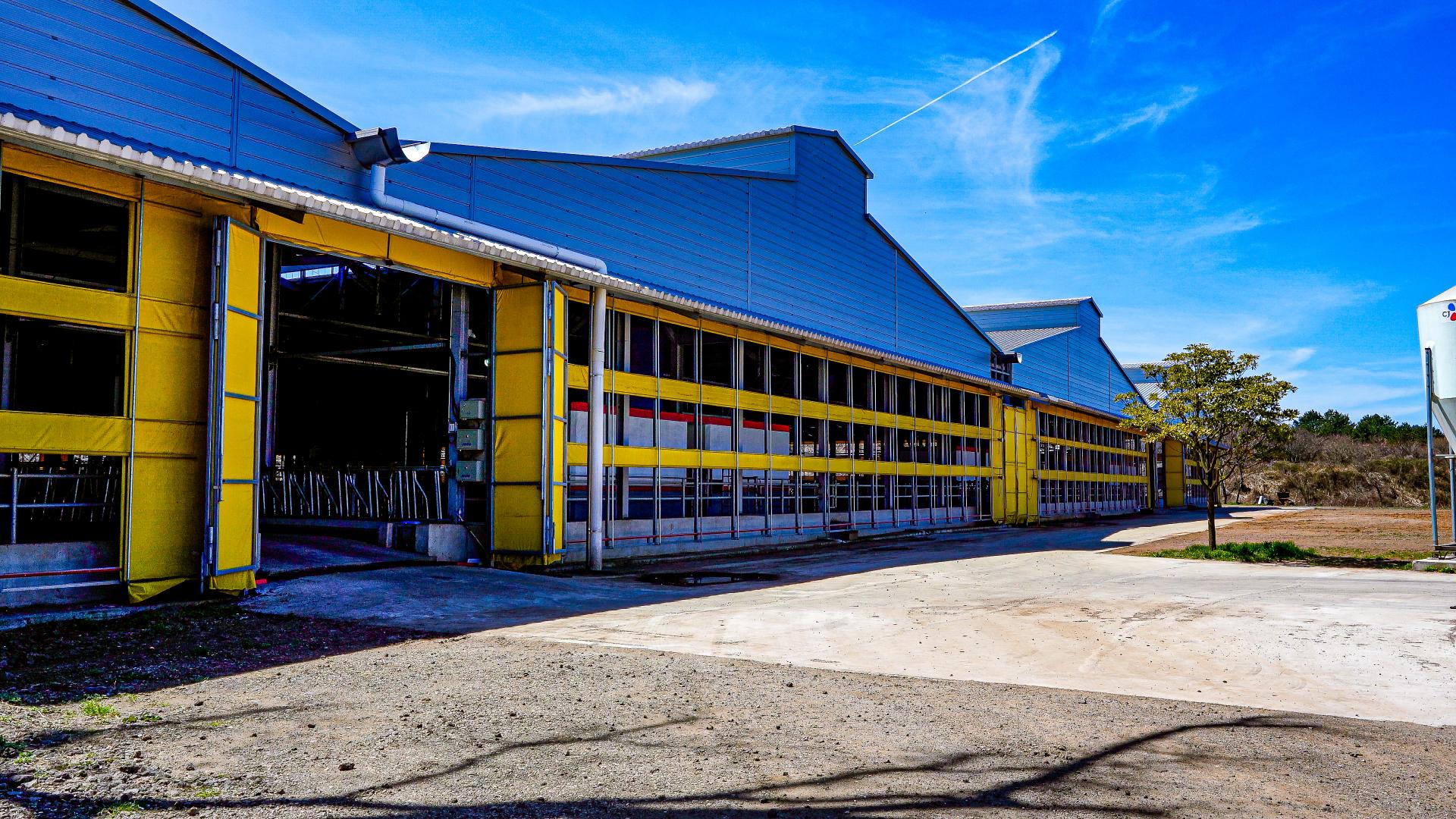
Q. Since 2021, you have been undertaking a major renovation of the farm. Could you tell us about the reasons, the process, and the current status?
To enhance competitiveness in the livestock industry, introducing ICT equipment is essential. We are currently automating our farms, allowing us to monitor the cows' health and milk quality in real-time. This system enables the cows to be milked comfortably at their preferred times, reducing their stress and thereby producing healthier milk. Jeju Milk is committed to animal welfare and believes that healthy milk comes from healthy cows. We strive to provide better taste and quality by adhering to this principle.
|
Collaborating with Local Farms to Offer Various Grades of Milk |
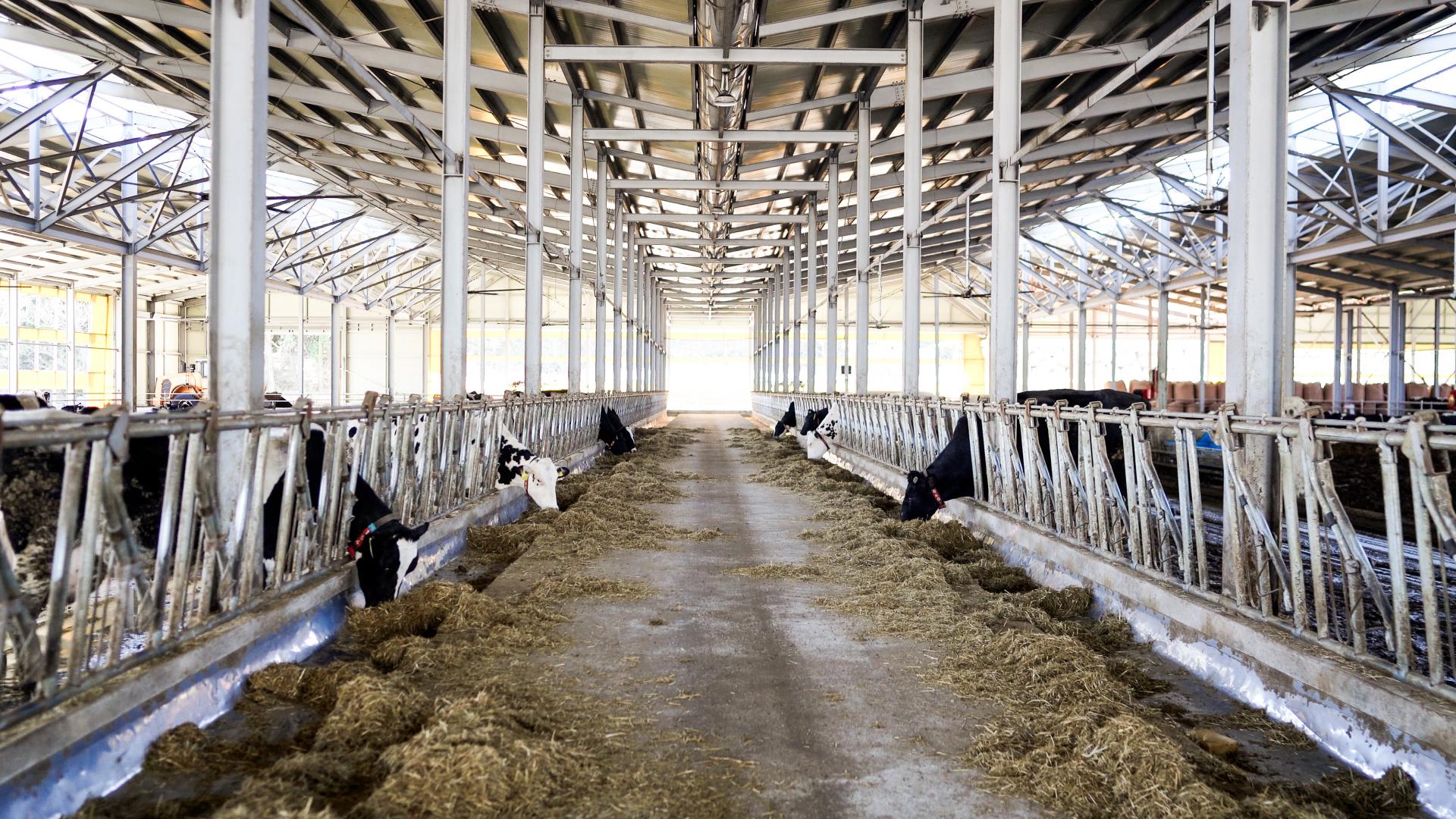
Q I heard there are 10 dedicated Jeju Milk farms on the island. How are these farms managed in an eco-conscious way?
We take a multi-faceted approach to environmental sustainability and animal welfare, ensuring that we do not harm Jeju's natural environment, which includes clean volcanic water, fresh air, rich soil, and vast pastures. First, we plan to supply low-methane feed, aiming to reduce carbon emissions by over 20%. In particular, our organic A2, Jersey cow, and antibiotic-free farms practice natural circular agriculture and have received certifications for eco-friendly organic farming and animal welfare, ensuring strict management. Additionally, some farms like Dawon, Geonjun, and Giseong have introduced robotic milking systems to enhance milking management. Dawon Farm, the largest among them, operates as an ICT smart farm, equipped with robotic milking machines, an automated feeding system, and manure processing equipment, ensuring the highest standards of quality and hygiene both domestically and internationally.
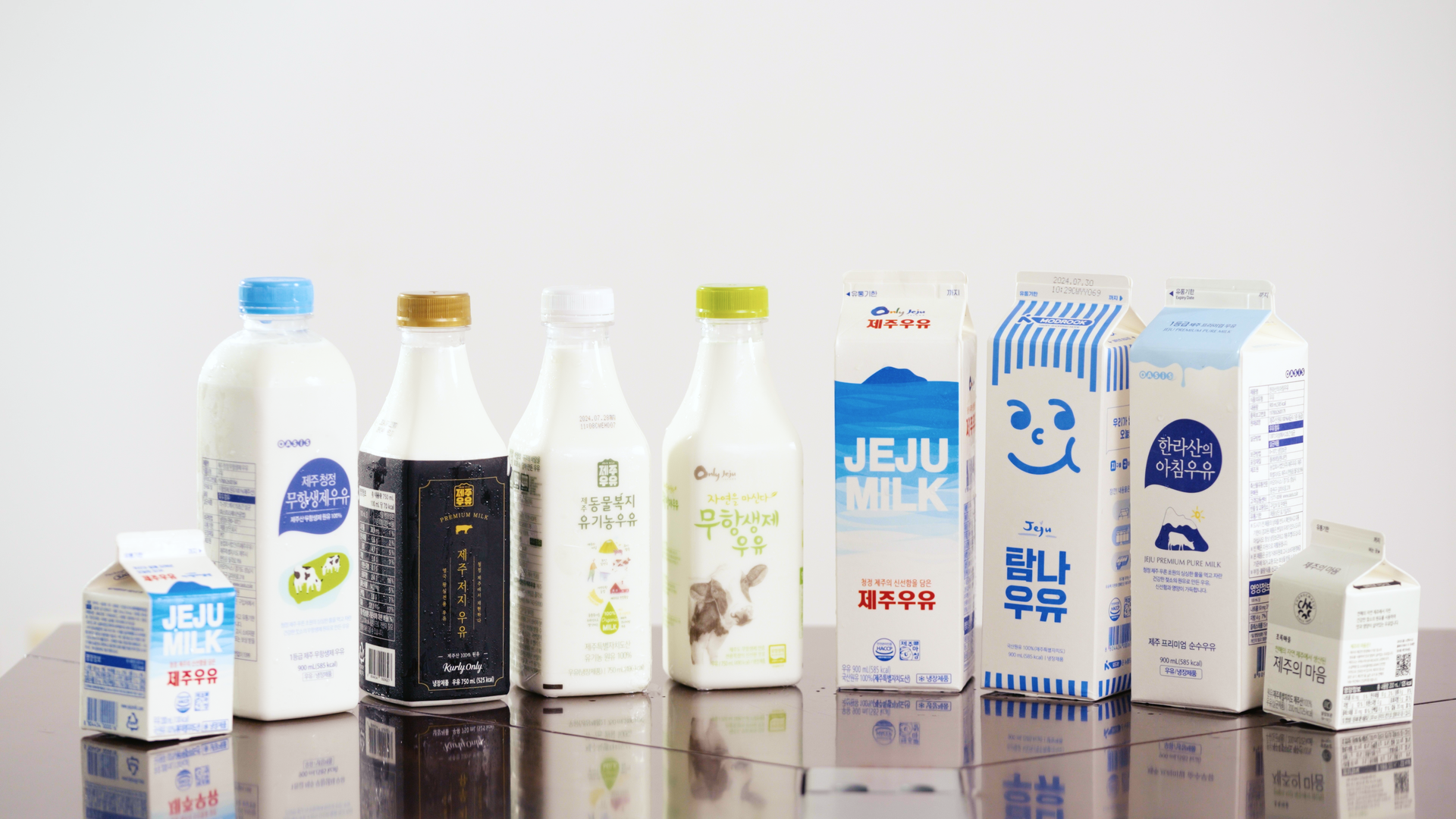
Q. What products does Jeju Milk currently offer?
Jeju Milk produces four types of milk products using various raw milk sources: Animal Welfare Organic Milk, Jersey Milk, Antibiotic-Free Milk, and Regular Milk. Our Animal Welfare Organic Milk, sourced exclusively from the Geonjun Farm, is produced using high-quality milk and the pasteurization process, which heats the milk to 72–75°C for 15 seconds to maintain freshness and minimize nutrient loss. Additionally, in collaboration with Dongwon F&B, we are the only producer in Korea of organic A2 milk, made from cows raised on organic feed in chemical-free environments, providing healthier and fresher milk.
Q. Can you describe the process from production to delivery of Jeju Milk products?
The raw milk collected from each farm undergoes processing to become finished products, which are then sorted in refrigerated warehouses and distributed to various sales channels. Jeju Milk currently supplies products to over 60 national sales agents and 161 clients.
|
Premium Jersey Cows for a Sustainable Future |
Q. Jeju Milk is the largest breeder of Jersey cows in Korea. What are Jersey cows, and why did you choose to breed them?
Jersey cows, often called brown cows, originated from Jersey Island to produce milk exclusively for the British royal family. Compared to the Holstein breed, which is commonly raised in Korea, Jersey cows are smaller and consume less feed, resulting in lower methane emissions and waste, thus contributing to reducing greenhouse gas emissions and achieving low-carbon dairy farming. Jersey cows are a perfect fit for Jeju Milk's ESG management, which aims to preserve the island's pristine environment. Although many farms in Jeju are considering switching to Jersey cows, they are still hesitant due to the early stage of market development. Jeju Milk aims to lead the market by operating Jersey cow farms and developing related products. We hope more farms will participate in Jersey cow farming in the future.
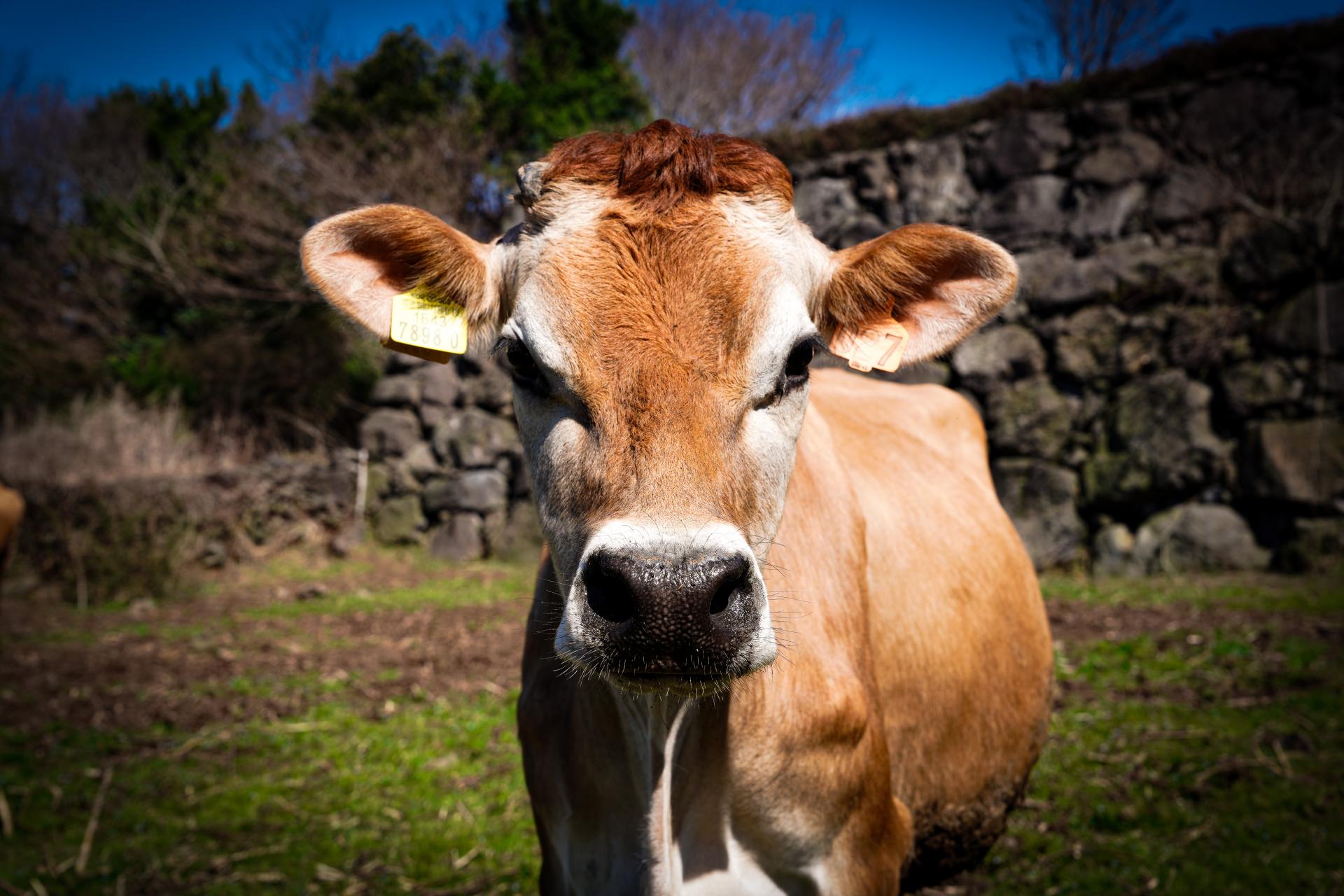

Q. I heard that Jersey Milk is performing well on Kurly. Can you elaborate?
Jersey Milk is rich in milk fat and protein, and it contains a high proportion of the A2 β-casein gene, which aids in digestion and absorption. We began selling Jersey Milk on the Kurly platform in March of this year, and in just four months, about 6,000 units have been sold. We plan to expand the Jersey product line to include yogurt, ice cream, and heavy cream.
|
Jeju Milk at the Forefront of the Sixth Industrialization of Dairy Farming |
Q. What are the advantages of operating a farm in Jeju?
.In Jeju, we can self-supply volcanic rock water and forage, and operate farms in a pristine environment with clean air and vast pastures. This allows us to meet the "seven essential elements of food," which include the five major nutrients plus water and air. The farm’s proximity to the processing plant also shortens the time it takes to distribute raw milk, enabling us to produce fresher products.
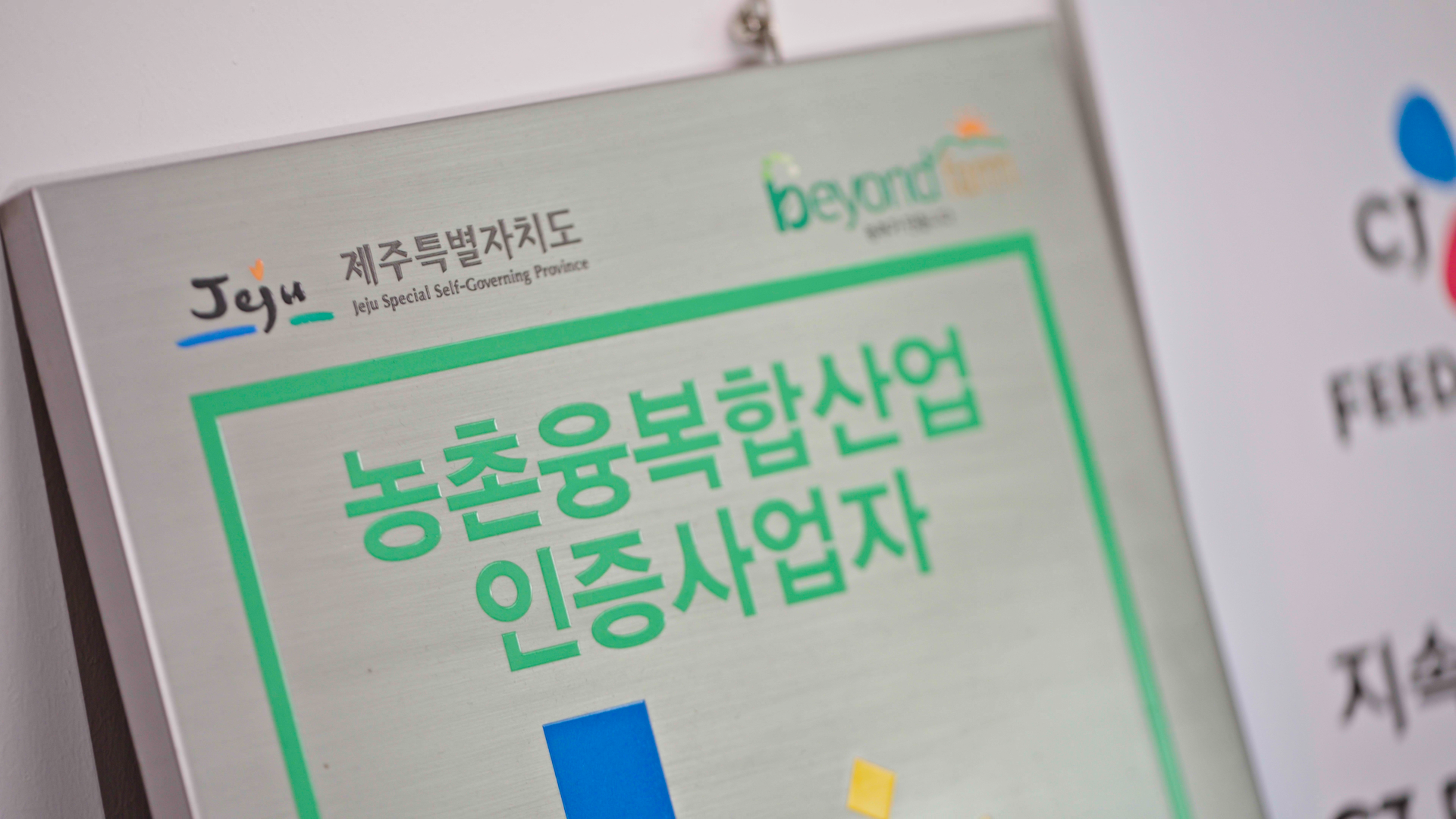
Q. The number of dairy farms is steadily decreasing. How does Jeju Milk plan to address this situation?
The declining birth rate and the expansion of imported dairy products have shifted consumer preferences, making it difficult for many dairy farms. Jeju Milk focuses on developing high-value-added products targeting consumers who seek products that prioritize taste, health, and the environment, a trend known as "value consumption." We aim to overcome the current challenges by developing products such as ice cream mix and fermented milk made with Jersey milk, and by creating premium products with certifications like low-carbon, animal welfare, and organic labels.
Q. What are your long-term and short-term plans and goals for business expansion?
Currently, Dawon Farm, operated by Jeju Milk, is the only farm in Jeju raising Jersey cows. We plan to establish a cooperative association for Jersey cattle farmers in the region to expand the number of Jersey farms on the island. We also intend to develop dairy products that highlight Jersey Milk's unique qualities, such as soft ice cream, yogurt, heavy cream, and butter, and establish Dawon Farm as a model for sixth industrialization by creating a Jersey-themed park. Our ultimate goal is to make Jeju a renowned dairy brand specializing in Jersey cows and to supply clean, high-quality dairy products and food from Jeju to the world. Our Jeju Milk team is committed to working diligently towards that day.
